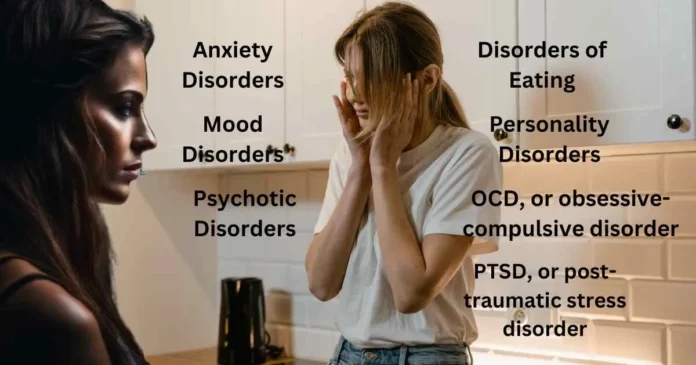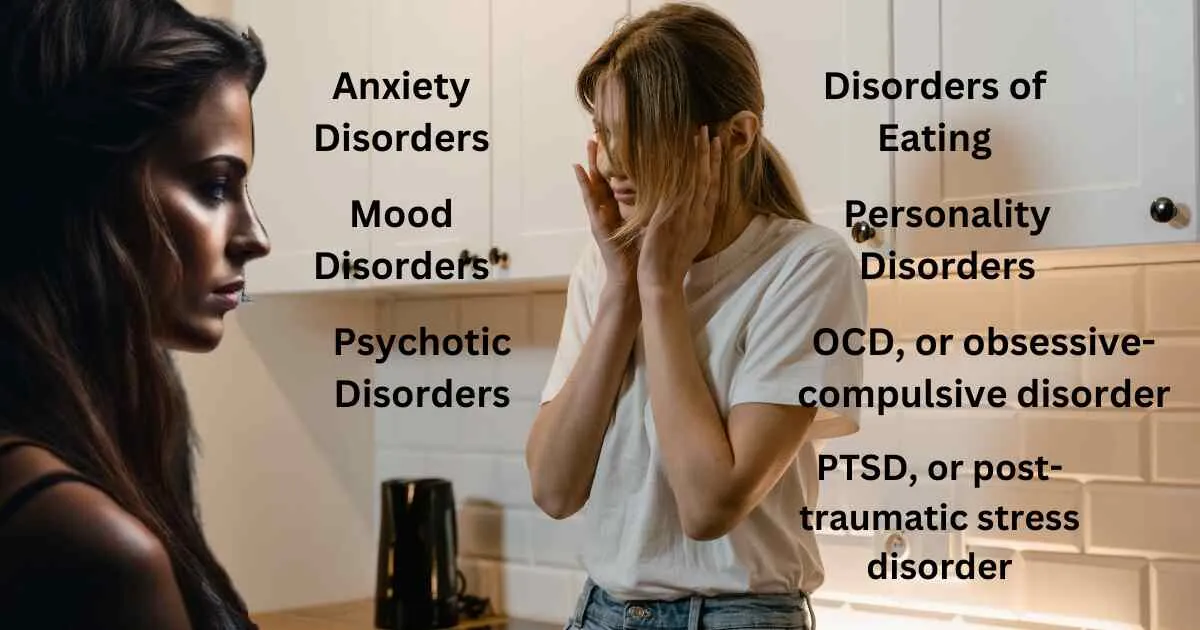Identifying mental health conditions
Mental disorders affect millions of people worldwide, yet there remains a significant stigma surrounding them. It’s crucial to understand what mental disorders entail and how they can impact individuals’ lives.
Anxiety Disorders
The hallmarks of anxiety disorders are excessive concern, fear, or trepidation. They might show up as panic attacks, phobias, social anxiety disorders, generalized anxiety disorder (GAD), and other manifestations.
Mood Disorders
Mood regulation disruptions are a feature of mood disorders, commonly referred to as affective disorders.This category includes depression, bipolar disorder, and cyclothymic disorder, where individuals experience extreme shifts in mood, energy, and activity levels.
Psychotic Disorders
Psychotic disorders involve disruptions to a person’s thoughts and perceptions, leading to distortions of reality. Schizophrenia is the most well-known psychotic disorder, characterized by hallucinations, delusions, and disorganized thinking.
Disorders of Eating
Negative body image and ongoing disruptions in eating behaviors are hallmarks of eating disorders, which are serious diseases.
Here are some important eating disorders that are listed below:
Personality Disorders
Persistent cognitive, behavioral, and interior experience patterns that defy social standards are characteristics of personality disorders.
OCD, or obsessive-compulsive disorder
What is OCD?
PTSD, or post-traumatic stress disorder
Experiencing or witnessing a distressing event might result in the development of PTSD. Flashbacks, nightmares, excruciating anxiety, and irrational thoughts about the incident are possible symptoms.
Symptoms and Characteristics
The symptoms of mental disorders can vary widely, depending on the type and severity of the condition. However, common symptoms may include persistent sadness, anxiety, irritability, changes in sleep or appetite, difficulty concentrating, and withdrawal from social activities.
Causes and risk factors
Mental disorders can arise from a combination of genetic, biological, environmental, and psychological factors. Biological factors may include imbalances in brain chemistry, while environmental factors such as trauma or stress can also contribute to their development. Additionally, certain personality traits and coping mechanisms may increase the risk of developing a mental disorder.
Diagnosis and treatment
Early diagnosis and intervention are crucial for effectively managing mental disorders. Diagnosis typically involves a thorough assessment by a mental health professional, including a review of symptoms, a medical history, and possibly psychological testing. Treatment options may include medication, psychotherapy, lifestyle modifications, and support groups.
Coping Strategies
Different coping strategies can be helpful for people with mental problems in addition to professional treatment. These could be regular physical activity, regular meditation, or maintaining a healthy lifestyle. And building strong support networks among friends and family.
Breaking the stigma
Breaking the stigma surrounding mental disorders is essential for fostering understanding and support within communities. We can create a more welcoming and supportive environment for those who are suffering from these conditions. By dispelling myths and encouraging open discussions about mental health.
Conclusion
Understanding the common types of mental disorders is the first step towards promoting mental health awareness and support. By recognizing the signs and symptoms, seeking early intervention,. And offering compassion and understanding. We are able to assist those who suffer from mental illnesses in leading happy and purposeful lives.
FAQs
Are mental disorders treatable?
Yes, many mental disorders are treatable with proper diagnosis and intervention.
Can mental disorders affect physical health?
Yes, mental disorders can impact physical health by affecting sleep, appetite, immune function, and overall well-being.






What i do not understood is in truth how you are not actually a lot more smartlyliked than you may be now You are very intelligent You realize therefore significantly in the case of this topic produced me individually imagine it from numerous numerous angles Its like men and women dont seem to be fascinated until it is one thing to do with Woman gaga Your own stuffs nice All the time care for it up
thanks dear
Thank you for the good writeup It in fact was a amusement account it Look advanced to far added agreeable from you However how could we communicate
thanks for writtinf comments